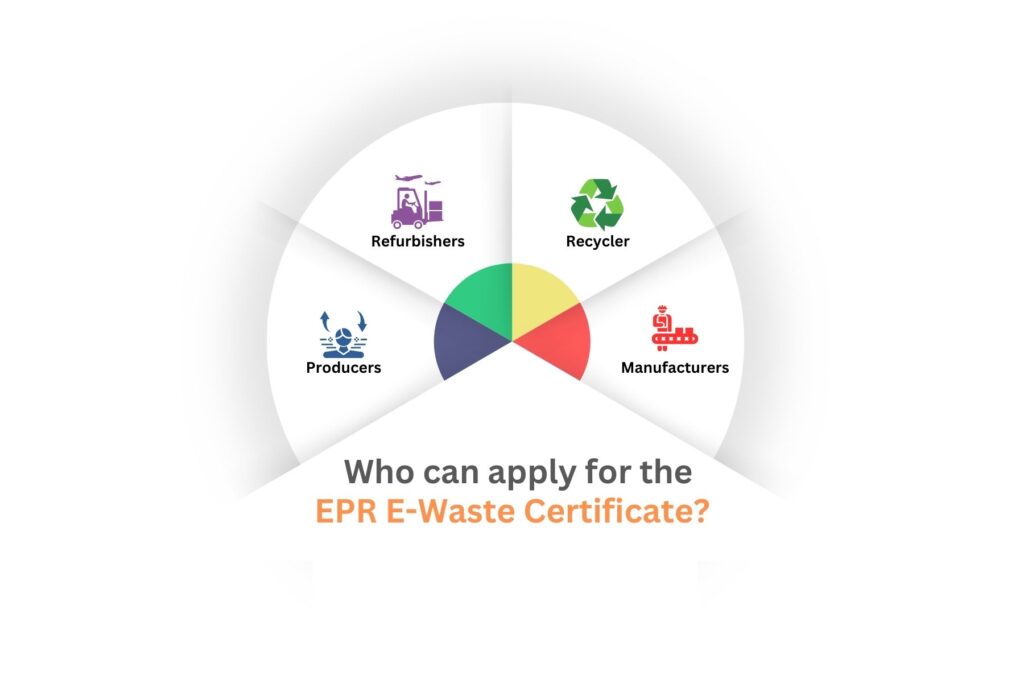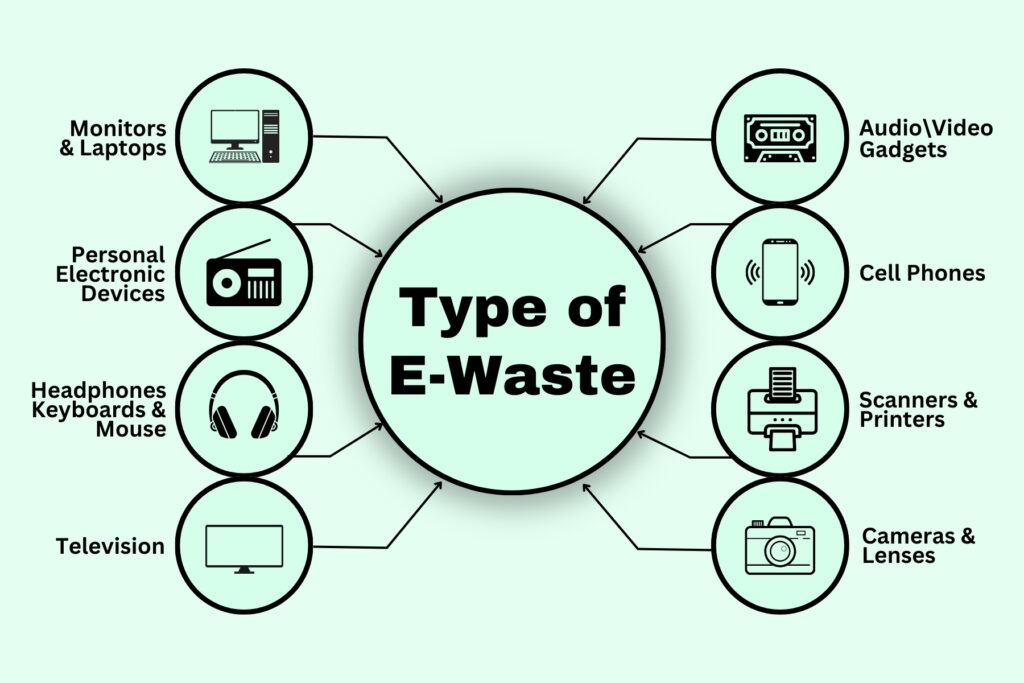What does EPR E-waste mean?
India is one of the largest producers of Electrical and Electronic waste in the world which creates a major challenge for the environment and human health. Due to lack of proper collection, recycling, and disposal of electronic and electrical waste along with public awareness, it results in a major challenge for the government. That’s where EPR E Waste certification comes in picture.
In order to manage this electronics or electrical waste, the government has introduced the concept of EPR under E-waste Management Rules 2016. EPR stands for Extended producer responsibility, in simple words, it can be defined as a person who introduces, whether by sale or other means in the Indian market any electronics or electrical product, it will be the responsibility of such person to collect and recycle the waste generated at the end of life of such electronic or electrical product.
Who is required to obtain EPR registration for E-waste Management?

The following persons are required to get EPR registration E-waste management
- Manufacturer
- Producers
- Refurbisher
- Recycler
Note: – If an entity falls into more than one category then the entity shall register under that category separately
Who is a producer as per EPR E-waste Management Rules 2016?
Producer means any person or entity who
- Manufactures and offers to sell electrical and electronic equipment and their components or consumables or parts or spares under its own brand; or
- Offers to sell under its own brand, assembled electrical and electronic equipment and their components or consumables or parts or spares produced by other manufacturers or suppliers; or
- Offers to sell imported electrical and electronic equipment and their components or consumables or parts or spares; or
- Who imports used electrical and electronic equipment; irrespective of the selling technique used such as dealer, retailer, e-retailer, etc.
Mandatory products list for EPR E-waste India ?
The two major product categories that require EPR Authorization are as follows.
- Information Technology and Telecommunication equipment
- Consumer Electrical and Electronics

What documents are required for registration of EPR E-waste?
Following documents are required for registration of EPR E-waste :
- Address proof documents of the Manufacturer/Importer.
- GST Certificate with address of Manufacturing Unit.
- Copy of documents/certificate of Company Registrar or Directorate of Company, or Import Export code letter.
- Copies of agreement document with dealers, collection centers, dismantlers, recyclers, treatment, storage and disposal facilities (TSDFs) etc.
- Self-declaration for compliance of RoHS in prescribed format.
- The technical documents (supplier declaration- description of product, document for materials, parts, and/or sub-assemblies and analytical test result)
- Copy of the permissions/licenses from the relevant ministry/department for marketing various products or for doing the business as given below:
- TIN details
- PAN details
- Incorporation certificate
- Copy IEC in case of importers
- Copy of authorization issued by the SPCBs/PCCs
- Documents related to EPR plan.
- Details of proposed awareness programmes and allied initiatives.
- Estimated budget earmarked for Extended Producer Responsibility (EPR)
What is the Procedure of Grant/renewal and refusal of EPR Authorization?
The producers, Importers, refurbishers, manufacturers and recycler should have to submit file before CPCB.
Application verification
Within 25 days after receiving an application, the central pollution control Board (CPCB) or a state pollution control board may verify and investigate the provided information.
Validity of EPR E-Waste
The Extended producers responsibility authorization shall be valid for five years
How to Apply for EPR E- waste India?
The process of EPR Registration involves following steps mentioned below:-
- Documentation: Applicant needs to prepare all required documents with EPR Plan for EPR authorization before submission of the application.
- Filling Application in prescribed format: Applicant needs to fill detailed information in prescribed application form with EPR plan.
- Offline submission of application: Applicant need to submit offline application with detailed information of producer and EPR plan to concerned department.
- Scrutiny of application: CPCB official will scrutinize the application and EPR plan is evaluated by CPCB for approval. If the documents presented are incomplete then CPCB officials may respond with a checklist within 25 days for clarification purposes.
- Grant of EPR approval: Chairman of CPCB shall approve the EPR plan as scrutinized by concerned officials. After approval of the EPR plan, the divisional head issues the EPR authorization.
How can 999 Waste Management Services help you?
We assist our clients in obtaining Extended Producer Responsibility E-Waste authorization from the central pollution control Board (CPCB). We have a team of experts that can help you to obtain your EPR Certificate. We are the leading EPR Registration consultant in (state) helping our clients to get EPR Registration in any part of India.
- We will assist you in documentation
- Providing the right consultation
- Follow-up with the government
- Delivering of license
- End-to end service
You can also get expert consultation regarding EPR for plastic waste from reliable EPR consultants like 999 WMS.
Our EPR consultant team helps the Extended Producer Responsibility E-Waste Authorization applicants during every step of the registration process, from documents preparation to grant of license. We directly coordinate with the CPCB officials for proper documentation and information flow during the whole certification process with proper follow-ups. For more information, connect with our experts team.
Frequently Asked Questions:
E-waste refers to electronic products nearing the end of their “useful life”, for example, computers, televisions, VCRs, stereos, copiers, and fax machines. Many of these products can be reused, refurbished, or recycled.
A producer’s financial and/or physical liability for a product is extended to the post-consumer phase of the product’s life cycle under the Extended Producer Responsibility (EPR) policy approach. It is important because it encourages manufacturers to create eco-friendly goods and lessen pollution.
The present EPR E waste policy ensures that every electrical and electronic equipment producer and their spare parts do not contain pollutants such as lead, mercury, cadmium, hexavalent chromium, polybrominated biphenyls, and polybrominated diphenyl ethers beyond a maximum concentration value. Every producer shall provide detailed information on the constituents of the equipment and their components or consumables or parts or spares, along with a declaration of conformance to the RoHS (Restriction of Hazardous Substances) provisions in the product user documentation.
Yes, EPR is mandatory for some products in India.
EPR policies helped a lot in increasing recycling activities and showed a positive effect on decreasing pollution. It has started showing positive effects throughout the country.
The EPR Certificate for e-waste is granted to manufacturers/importers of electronic products by CPCB to deal with the issue of e-waste produced by them.
